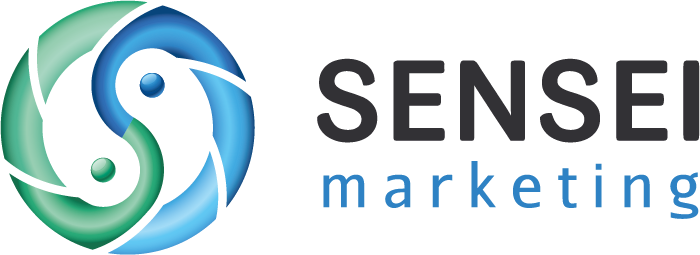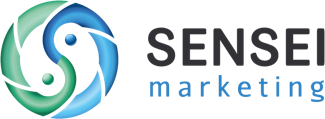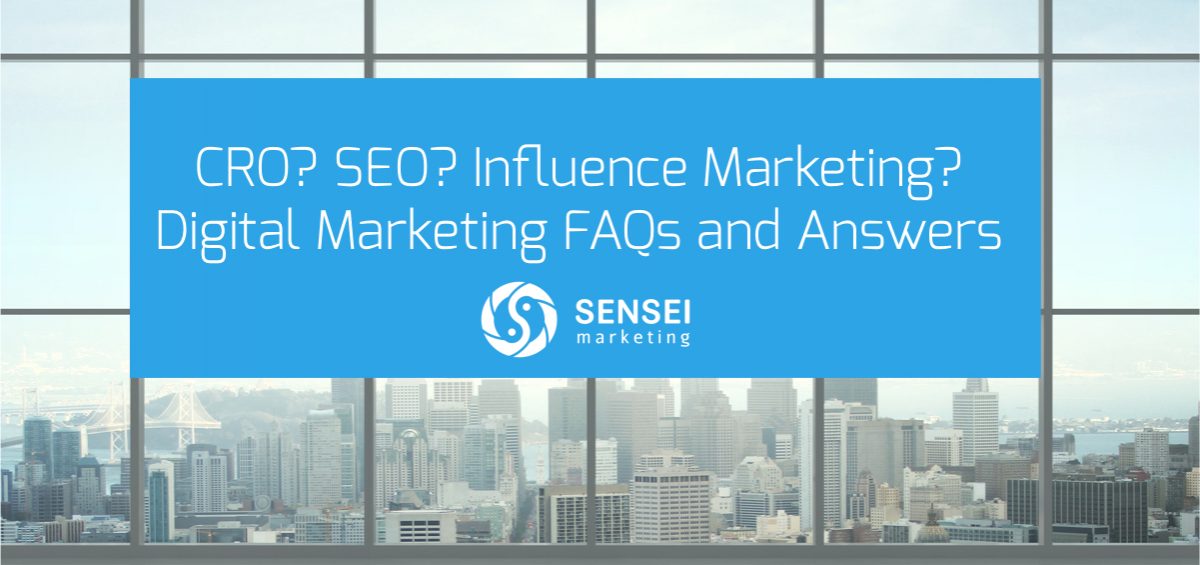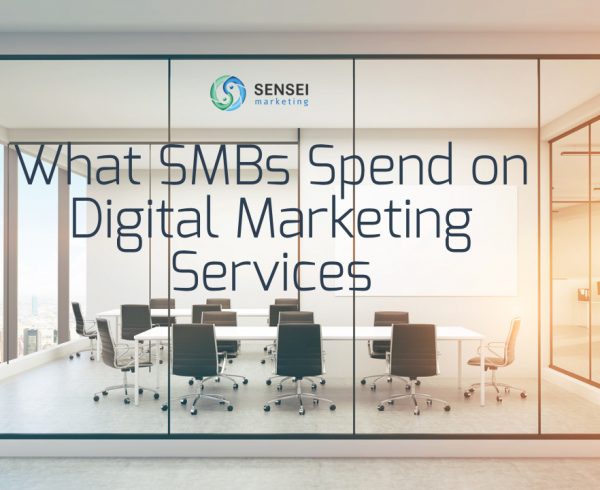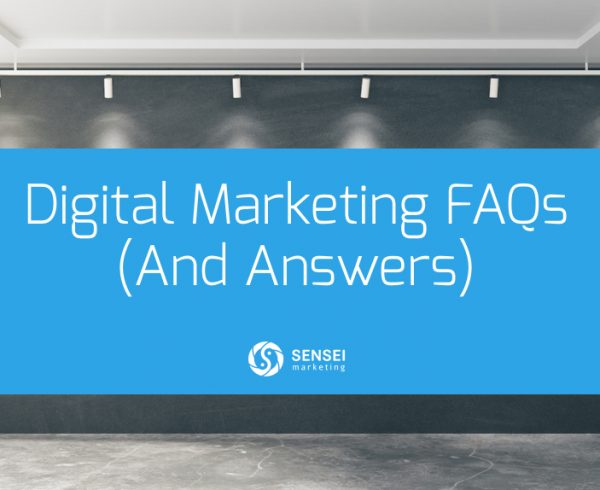Updated June 2017
Digital marketing moves fast.
No matter if you’re a small biz or big enterprise, it’s difficult to keep up to date with everything going on.
So let’s take a breather, and I’ll try to answer some of the more common digital marketing FAQs.
What is CRO?
Conversion Rate Optimization. It’s basically the practice of using testing to improve a web, landing page, or any other place where you want visitors to take action, in the effort to increase conversions.
CRO is a growing practice, because it involves experimenting, data, user behaviour, and creative thinking to ultimately generate more leads. And doubling your website’s conversion rate has the same impact as doubling it’s traffic – and it’s a lot cheaper to do.
A couple great CRO resources include Unbounce, ConversionXL, and VWO.
What is Influence Marketing?
Influence Marketing (IM) is growing in both importance and investment.
In fact, 84% marketers have at least one influencer marketing campaign planned for 2017 (source: Acorn Influence).
Influence Marketing means engaging those who hold influence over your audience, with the goal of having them help promote your product or service in some way, shape, or form.
What’s important to understand is that influencers are NOT necessarily those who have massive social media followings, but rather those who can directly impact the decision-making of their audience.
There’s lot of Influence Marketing tools to help you find, engage, and manage influencers.
What is SEO in 2016?
It’s difficult to answer this in a single sentence, but I’ll give it a try…
SEO is about raising or maximizing your online profile, while also providing your website visitors with a great user experience.
How do you accomplish these things?
Here’s a (very) non-comprehensive list:
- (Cliche alert) Create unique, interesting, and valuable content
- Create different forms of content (blogs, infographics, video)
- For those who mention you on the web, ask for a link as well
- Use social media, email, guest posts, and forums/commenting to help get your brand out there
- Get reviews and referrals for your product or service
- Ensure your website has clean code and compressed images for fast load times
- More and more people are browsing on mobile phones – make sure your site is mobile-friendly
- Forget one-size-fits-all-websites; use personalization and testing tools for the most relevant user-experience (UX)
What are Marketing Automation Tools, should I use them?
As I’ve written about in the past, marketing automation tools are great for a lot of things: except for automating marketing.
What I mean is that these tools are not marketing panaceas. You first need a marketing team that can help with things like: lead nurturing strategies; email design and email campaigns; landing page design, testing, and optimization; data and analytics; conversion paths, mobile and SMS; and much more.
A marketing automation tool should complement a marketing team, not the other way around.
If you have a team, and have a decent amount of traffic to your website, an automation platform is probably worth considering.
As for which platform to use, I’m pretty neutral – I haven’t come across one that stands out against the rest.
Google, Facebook, Twitter, LinkedIn…where should I be advertising?
Generally, I recommend to B2B clients that they use Google AdWords (including Bing/Yahoo), LinkedIn sponsored updates, and even Twitter.
For B2C, I recommend AdWords, Facebook, and Twitter.
But whenever in doubt, test, try, and optimize.
All these platforms are becoming more sophisticated in terms of being able to target the right audience (at the right time), but they are also becoming more cluttered and competitive. I’m biased, but my advice is to use a paid search company such as Op Ed Marketing to manage your advertising campaigns 🙂
What should I be doing on Social Media?
Whatever you’re doing on social media should align with your business goals.
Use it to:
- deliver a better customer service experience
- share your content (and other people’s content)
- engage with prospects, customers, and influencers
- generate leads
- listening to what people say about your brand, your products, and your competitors
- garnering feedback and surveying people
- launch contests and promotions
- share experiences at events
Most importantly, use social media to create real, actual, professional relationships, which I wrote about here.
When should I hire a Marketing Agency?
I hear it all the time…”do I need a marketing agency”, “when should I hire a marketing agency”, “how much do they cost”?
Again I’m biased, but I’m a firm believer that a marketing agency can benefit most businesses regardless of size.
As for cost, it all depends of course, but a digital agency can often cost no more than a single full-time marketing employee.
However, some of the advantages include:
- Access to an Entire Team
- Multiple skill-sets and range of experiences
- Business Continuity (Agencies won’t quit or leave)
- Know what’s worked for other B2B Businesses
- Efficient Systems and Software often already in-place
- You’re Not Paying for Recruitment, Training, Benefits, Equipment, Taxes, Vacations, Sick Days and other Employee Expenses (while an Agency is a Business Expense)
- The Outsider Advantage of assessing your Brand and Business
- Speed and Scalability to easily increase staff and resources as needed
- A Single Contact for all your Marketing Needs
- Measurable Results and ROI
So consider hiring a digital agency to complement your existing marketing team, or be your marketing team, the costs and benefits can be substantial.
What can I do that my Competitors aren’t doing?
I answered this question in a previous blog, and my answer is probably still the same: testing and conversion rate optimization.
Businesses pay $92 driving traffic to their website for every $1 they invest in conversion.
A website is NEVER done. You need to continually test and experiment with different messaging, imagery, offers, and user experiences to keep moving your conversion needle forward.
And if you’re a B2B business, here’s 3 tips to help get a leg up on your competition.
As well, it never hurts to look into attending digital marketing workshops and conferences or sharpen your skills with online training.
What is local search and why is it important?
Local search is the use of a geographic tag, such as a zip code, city or state as a part of the search stage when performing an online search.
Local search is a good way for search engines (Google, Bing or Yahoo) to bring relevant results for businesses or products and services within a geographic area.
An example of a local search (also referred to as Local SEO) would be entering “Japanese restaurants in Los Angeles” into the search box.
Businesses with a physical location, such as restaurants can get huge benefits from optimizing their online presence for local search opportunities.
What is PPC?
PPC stands for Pay Per Click, a method to drive traffic to your website by paying a fee each time one of your ads is clicked. PPC can be very profitable if it is managed correctly.
The most popular PPC is Google Adwords, however, there are many others, such as Bing advertising, Yahoo search ads, LinkedIn advertising and Facebook advertising.
Why do Search Engine Rankings constantly change?
The web is an active place and the search engine results pages (SERPs) can change on a regular basis.
There are various factors that affect the rankings for a given website and a given keyword on any given day. These can include:
- New websites or pages and content are found by search engines on a daily basis and may skip ahead of existing pages in the rankings.
- Older websites and content can be removed from the web or there is a decrease in relevancy due to content that isn’t updated or it is rarely visited over a long period of time.
- Older websites improve their SEO by making their content more attractive to search engines and visitors.
- Search engines can change how they evaluate websites, content and links, which can cause the rank of a given page or keyword to fall or rise without any changes by the website owner.
What is the difference between on-page optimization and off-page optimization?
Off-page optimization is the process of boosting your search engine ranking by getting external links to point back to your website.
On-page optimization is directly dealing with the content and structure of your website.
What are meta tags?
Meta tags refer to the meta title tags and meta descriptions, which provides Google and viewers with information about a webpage in the search results.
A meta title tag appears at the top of the browser and serves as the title of your page. A meta description appears under a SERP listing and it is a way to attract viewers to visit a page.
Meta tags should also include a company name and a target keyword that corresponds to the page.
What is lead generation?
Lead generation is a method used in marketing to create interest in a product or service and establishes a channel for sales.
It involves the collection of potential customer contact information, such as a name and email address. These prospective customers can then be reached out through email marketing, whitepapers, product videos, etc.
What is the difference between organic rankings and Adwords?
Organic rankings refer to natural traffic lead to your website. The traffic could be based on services offered, the appeal of title and meta descriptions or the brand recognition built.
Adwords is an advertising platform in which businesses pay to run ads for their sites. These ads usually appear on the top or side bars on a results page and it will be indicated they are not organic.
What is a “call to action”?
A “call to action” refers to a statement that leads a person to do something. It can be something like “Call us today” or “Click here to find out more info.”
A “call action” should simple, direct and prompts the reader to do something. Calls to action should be included in meta descriptions, ads, email marketing, blogs and web page content.
What is a landing page and why do I need one?
When someone clicks on your ad, they should be directed to a page specifically designed for that ad, not your main website or homepage.
Having a landing page makes it easier to lead visitors into completing a call to action or towards a conversion.
Is social media marketing better for B2C or B2B businesses?
Social media is important for both, but in different ways. B2C businesses can focus on fun and light-hearted social media posts, but B2B businesses should use social media to share valuable industry content.
Have any more questions? Ask away 🙂
